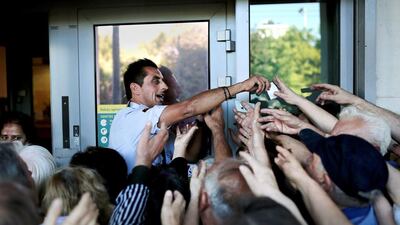Greek stocks traded in New York rallied yesterday even as the prime minister Alexis Tspiras urged voters not to accept proposed austerity measures in a referendum on Sunday.
Banks remained shut in Greece for a fifth day as the battle between the government and its lenders threw the country into turmoil. Shares of National Bank of Greece that are traded in New York as American depositary receipts led the rally, jumping by as much as 12 per cent. The Global X FTSE Greece 20 exchange-traded fund was up 4. 8 per cent. The Greek government’s 10-year bond price rose 2.1 per cent.
Other European stocks joined in as the benchmark Stoxx advanced 2.1 per cent. The S&P 500 rose as much as 1 per cent in early trade.
Even an evening television appearance by Mr Tsipras urging his people to vote “no” to the latest proposals from creditors failed to badly dent the early rally.
The gains are being driven by speculation that Mr Tsipras will cave in to the demands of Greece’s euro-zone creditors and accept a reform for a cash deal that he has so far shunned.
Investors are also betting that voters will vote “yes” on Sunday, possibly paving the way for the prime minister’s resignation.
In a dramatic move early on Saturday, Mr Tsipras, who was voted in this year on a platform to end years of Greek austerity, announced the closure of banks and the stock market ahead of Sunday’s referendum. European finance ministers are pushing for an agreement that will mean more spending cuts and higher taxes for Greeks. The country’s total debt load is more than €300 billion (Dh1.22 trillion), which is equivalent to 175 per cent of GDP.
Even though the Athens stock exchange has been shut since Friday, there has been a brisk trade in Greek stocks and an exchange traded fund that tracks a basket of the country’s equities in New York. The US depositary receipts of National Bank of Greece plunged by as much as 30 per cent on Monday but have since been recovering. On Tuesday, they rallied 7.8 per cent.
While markets are pricing in a quick resolution or expect Greeks to vote “yes” on Sunday, others are more cautious given that Germany, the biggest creditor, has said that it will not consider a deal until the outcome of the referendum is known.
“Volatility in European equities, peripheral bond yields and the euro is likely to rise in the coming week,” Standard Chartered told its clients in a note. “Heightened uncertainty on both the stability of Greek banks and the referendum outcome are likely to temporarily raise volatility in European asset markets. Safe havens like gold and the Swiss frank are likely to be short-term beneficiaries, although gains are likely to be relatively small.”
The rally comes even after Greece missed a $1.6bn payment to the IMF on Tuesday. The stand-off between Greece and its creditors peaked on Friday when Mr Tsipras said that he would put the proposals of the euro-zone finance ministers for an extension of the bailout package to the Greek people in Sunday’s referendum. At stake however, is Greece’s membership of the euro monetary union and a vote against the proposal of the creditors is widely considered a vote against Greece’s euro membership.
Economists are divided about whether a split from Europe would be good for the country. Some say that a break from the monetary union would relieve Greek taxpayers from a spiral of debt that is impeding its growth.
“We believe that a possible Grexit from the euro zone will be good for Greece,” said Soumya Kanti Ghosh, the chief economic adviser at the State Bank of India.
“Reckless fiscal austerity imposed on Greece will continue to remain a non-starter.”
The country’s debt crisis originated in the 2008 global financial crash, in the aftermath of which it was revealed that the Greek government deficit was four times the size of what was permitted by euro-zone rules. Over the years, the Greek government had been overspending on the salaries of public employees among other things, while economic output failed to keep up with the spending.
Greece’s economic troubles reached a peak in 2012 when the European Union and the IMF bailed it out and creditors were forced to writedown €100bn of privately held bonds. Talk of Greece exiting the EU and euro, threatening the single currency bloc, were quashed when the European Central Bank governor Mario Draghi said he would save the euro at all costs. The euro had retreated 0.2 per cent against the dollar at 7pm UAE time.
mkassem@thenational.ae
Follow The National's Business section on Twitter

